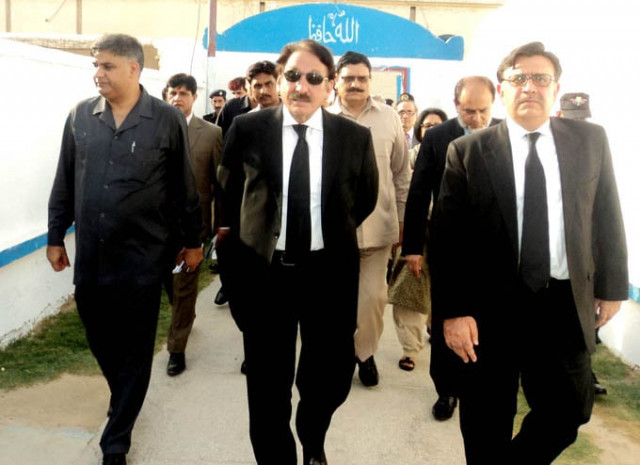Institutional clash: An old tale told afresh
Parliament wants one thing; the court another.

File photo of Chief Justice Iftikhar Muhammad Chaudhry visiting Mianwali Central Jail. PHOTO: PID/FILE
Some questions are best left unasked.
For the best part of its five years, the last government was criticised by all and sundry for stoking institutional conflict because the then-administration of Yousaf Raza Gilani took exception to certain orders and directions from the Supreme Court.
The Gilani government’s rationale was that it was merely attempting to draw boundaries between institutions – a rationale that was vociferously rubbished by opposition parties both inside and outside parliament, as well as in the media.
The reality is that a similar situation has arisen as of Thursday over the issue of conducting local government elections. Parliament wants one thing; the court another. Why is a different government having the same problem?
Why does parliament have to once again stress its ‘sovereign political will’?
Whatever way one wants to read it, the resolution passed by the National Assembly on Thursday has opened up another chapter of institutional conflict in Pakistan. This time, all political forces in parliament passed the resolution that is, in essence, what the Gilani government was saying for the best part of five years: institutional boundaries need to be respected.
Leaving aside whether or not this latest clash of wills redeems the last PPP government, the standoff is far more puzzling than those seen during in the past.
It is puzzling because, fundamentally, it is not really an issue that ought to be creating this much fuss. It is not like the court has ordered the government to write a letter, and the government has refused.
By hearing the case on local governments, the Supreme Court has pushed the provinces to hold elections sooner rather than later. The governments, which were admittedly sleeping on the issue, have agreed, and have been pushed into necessary action. Mission accomplished. There should be no conflict here.
The only problem is the timeframe. The Supreme Court wants the polls held later this month in Sindh and in early December in Punjab and Balochistan. The body that will hold the elections, the Election Commission of Pakistan (ECP), has followed through on the orders partially by announcing it will hold the polls in Balochistan on the given date. But after long consultations, the court was told by the ECP that polls in Sindh and Punjab are not possible within this timeframe because of the sheer amount of legal work and preparation that is left, such as fresh delimitation, finalisation of laws, framing of rules and finally the secure printing of tens of millions of ballot papers for the two largest provinces of the country. This conclusion was reached after days of consultations with all stakeholders.
Even if, by some gargantuan effort, the polls are held by circumventing ideal scenarios, the process will be open to lots of controversy – no matter which way the results go. Already the appointment of Returning Officers – officials that will be key to the entire process – has created ripples. Yet the court will have none of it. In fact, far from sympathising, the chief justice has warned the authorities of serious consequences if the dates are not respected.
Why cannot the authorities be allowed an extra month or so to do this the right way and to avoid unnecessary controversy for a fledgling democracy? The authorities will hold the elections, but why is the chief justice-led bench in such a hurry? The fundamental question here is what will change a few days after December 7?
What will be gained by holding the elections on December 7 instead, say, of January 7, 2014? The Supreme Court as an institution will still be accredited with having pushed the elections through.
On the face of it, all that is being achieved at the moment is the ECP, which ought to be autonomous and all-powerful, being pushed into a corner and discredited. It has the warnings of the apex court to deal with and the exhortations of Parliament. No institution wins here; all lose, particularly the ECP, which is the key to a credible democratic transition.
If the ECP doesn’t follow the orders, will the Supreme Court summon its chief to court or charge him with contempt, just like it hauled up the defence secretary on the same matter? The chief election commissioner is the head of the ECP, after all, and would be in loop on all the decisions and consultations. The ECP, of course, is currently being headed by an interim chief after Fakhruddin G Ebrahim’s resignation. You may know the current chief: He is Justice Tassaduq Hussain Jillani: A justice of the Supreme Court, and the man who will become chief justice after December 12, when Justice Iftikhar Muhammad Chaudhry retires. If not, then what is the sound and fury for? That is one question left best left unasked.
Published in The Express Tribune, November 10th, 2013.



















COMMENTS
Comments are moderated and generally will be posted if they are on-topic and not abusive.
For more information, please see our Comments FAQ